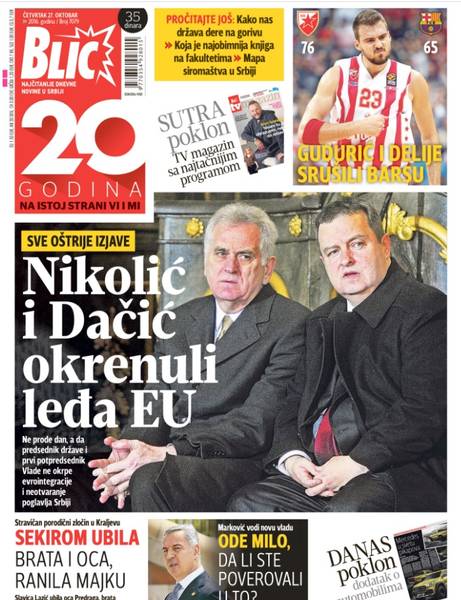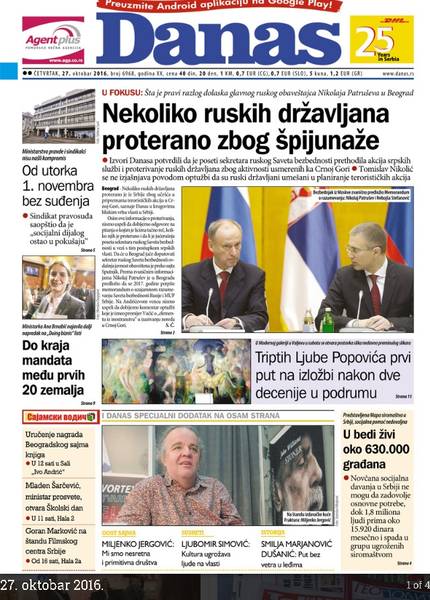Is the Priština-Belgrade Dialogue in Danger, and thus Serbia's Negotiations with EU?
Adelina Marini, October 27, 2016
 Leading subject for Croatian media on Thursday is last Wednesday’s earthquake in Italy, Serbian media continue on the spy affairs, but also on Serbia’s European integration. EU membership is on the cover pages of Macedonian papers as well. Without doubt, the most important subject in Thursday’s press review of regional media is the crisis in the negotiations between Serbia and Kosovo. Serbian national TV channel RTS reports, that Belgrade has been given a new requirement for opening of new negotiation chapters because of Priština. As was reported on Wednesday too, the Slovak presidency has confirmed that currently there is no new date for the opening of new chapters. According to the TV channel, it is still not clear if the reason for this is the stalling of the Belgrade-Priština dialogue. Marko Đurić, director of the government Office for Kosovo and Metohija announced for RTS that there will be a government meeting on Thursday, dedicated on the subject.
Leading subject for Croatian media on Thursday is last Wednesday’s earthquake in Italy, Serbian media continue on the spy affairs, but also on Serbia’s European integration. EU membership is on the cover pages of Macedonian papers as well. Without doubt, the most important subject in Thursday’s press review of regional media is the crisis in the negotiations between Serbia and Kosovo. Serbian national TV channel RTS reports, that Belgrade has been given a new requirement for opening of new negotiation chapters because of Priština. As was reported on Wednesday too, the Slovak presidency has confirmed that currently there is no new date for the opening of new chapters. According to the TV channel, it is still not clear if the reason for this is the stalling of the Belgrade-Priština dialogue. Marko Đurić, director of the government Office for Kosovo and Metohija announced for RTS that there will be a government meeting on Thursday, dedicated on the subject.
"If Priština thinks that talks should be led with conditions and ultimatums and other ways, which are not acceptable to Serbia, if it really is not ready for another manner of holding a conversation, and if with their statement they present a condition for continuing the dialogue, this means that they are giving up on dialogue and that there will be no dialogue”, said Đurić from London, where he is visiting. According to the Kosovo internet website Koha, Priština has set four new conditions for the dialogue to continue – demarcation of borders between Kosovo and Serbia, respecting neighbours, non-interference and cessation of Serbia’s interventions in Kosovo, cooperation in spheres of mutual interest.
"Who do they think they are giving conditions to? The dialogue will continue, but not under Priština’s conditions. Serbia will continue to be constructive and Priština is not assigning the subjects”, stated the First Deputy Prime Minister and Minister of Foreign Affairs of Serbia Ivica Dačić in an interview for RTS. He believes that the attempts of Kosovo’s Chief Negotiator at the Brussels Dialogue Edita Tahiri are “a disgrace for domestic use”. On page one Vecernje novosti reports that a full one third of EU member states are blocking the opening of new negotiation chapters with Serbia, more specifically Chapter 31, which covers foreign affairs and security. Among the ones blocking it are Germany, Great Britain, and the former Warsaw Pact states – the Czech Republic, Hungary, Bulgaria, Poland, and Romania, reports the newspaper, quoting its own sources.
The reason for blocking this chapter is that Serbia is expected to be much more active in the harmonisation of its foreign policy with that of the EU, meaning introducing sanctions against Russia. According to Vecernje novosti’s data, Serbia has discarded 30 documents during last year and the year before, which makes almost half the declarations that Brussels has issued. In the year 2015, 13 documents out of 40 were discarded and in the previous year Serbia has disagreed with 17 out of 35. The first page of Blic today shows that President Tomislav Nikolić and Deputy PM Ivica Dačić have turned their backs to the EU. “Not a day goes by without the president and the first deputy PM criticising European integration and the non-opening of new chapters”, reports the paper. We will not be able to read more details on the subject until tomorrow.
This is the leading subject of Politika as well. Under the headline “Dačić's European Slowing Down” the newspaper reports that the message of the head of Serbian diplomacy Ivica Dačić that no new chapters should be opened practically means giving up on European integration. All this began when Marko Đurić accused Brussels of Serbia being given ultimatums.
Russian spies got expelled from Serbia
The front page of Danas today informs that several Russian citizens were expelled from Serbia under accusations of espionage. The newspapers’ sources have confirmed that right before the Wednesday visit of Secretary of the Security Council of Russia Nikolai Patrushev, there was an operation of the Serbian agencies and several Russian citizens were expelled on counts of activities against Montenegro. In the meantime, the Montenegro's national television reports that NATO is not checking up on data for terrorist attacks being planned in Montenegro, which has earlier this year received an invitation to join the Alliance against Russia’s will. The averted terrorist attacks in Montenegro were not discussed at the Wednesday meeting of NATO ministers in Brussels, reported Hungary’s ambassador to NATO Péter Sztáray. Slovenian State Secretary Miloš Bizjak, however, believes that the incident is worrying for Slovenia as well, which is close to Montenegro.
Why are Greece and Bulgaria in the way of Macedonia’s European integration?
Macedonian Dnevnik asks on its leading page "How are we to sign a treaty both with Athens and Sofia, if Macedonia is both Greece and Bulgaria at the same time?” The question is provoked by the recent statement of Greek President Prokopios Pavlopoulos that Macedonia is Greece. “If nationalist messages coming from the neighbouring countries Greece and Bulgaria continue to prevent the development of good neighbourly relations, the condition of Macedonia being a good neighbour if it wants to continue the accession process will remain sealed. The question is why is this a precondition for Macedonia entering the EU circle, when good neighbourly relations are being made problematical by member states themselves”, continues Dnevnik.
This is the headline of Utrinski vesnik as well, which is looking for the motivation of Mr Pavlopoulos to defend the Greek character of Macedonia every three days, when this is not even an issue in the election campaign in Macedonia. “Why are there messages being sent so eagerly to Macedonia, when no one is causing it and when diplomatic culture demands that there should be no such influence over a country before elections, especially as important as those coming up on December 11?”, asks Utrinski.
Turkey demands that Serbia closes Gülen schools
Serbian Blic reports that the Turkish government has sent an official request to the government of Serbia for the closing of schools under the patronage of Fethullah Gülen. This was confirmed for Blic by Mehmet Akarca, Senior Adviser to the Turkish Prime Minister Binali Yıldırım. According to Akarca, Gülen supports a school in Belgrade, but there are suspicions that there are others on Serbian territory. “Most schools like these are, speaking of the Balkans, definitely in Bosnia and Herzegovina. I would advise  your government and all other Balkan states to investigate such institutions and interrogate people working there before it is too late”, said another Turkish representative to the newspaper. Blic reminds that word is of the primary school “Bejza” in Čukarica and the “Bejza Education Centre” in downtown Belgrade.
your government and all other Balkan states to investigate such institutions and interrogate people working there before it is too late”, said another Turkish representative to the newspaper. Blic reminds that word is of the primary school “Bejza” in Čukarica and the “Bejza Education Centre” in downtown Belgrade.
Plenković starts a war on populism
The new Prime Minister of Croatia Andrej Plenković is starting an active battle against populism by deciding to talk more on foreign affairs and European subjects. During his report to Parliament on his participation in the European Council last week Mr Plenković replied sharply to the new leader of the anti-European and anti-NATO party Live Wall Ivan Pernar, who ever since the work of the new Sabor began has been giving loud provocative speeches, aimed against the EU and NATO. In his speech during the debate on Wednesday, Mr Pernar stated that Croatia continues with its policy of sanctions against Russia, although these sanctions are of no use. “Regarding Crimea, Crimea was not captured by force, this was the will of the people”, further said Ivan Pernar, quoted by Vecernji list, which outraged the Croatian prime minister.
"I don’t know anyone in the Croatian parliament, who after the attempt at aggression against Croatia of 1991 and being a little better informed than you, could stand on such positions, when we are talking about a violation of international law, when we are talking about non-compliance with bilateral agreements, and when we are talking about the annexation of another country’s territory. If such rhetoric, as you are using now, colleague Pernar, existed in Croatia, today we would not have 56 thousand square kilometres and parts of Croatia, which today are an integral part of our territory, would very likely not be a part of our territory at all, and this is something which, perhaps, you do not pay attention to in your speeches, but you should pay attention to not being the one defining Croatia’s foreign policy”, retorted the Croatian PM, who headed the European Parliament’s Delegation for relations with the Ukraine before being elected prime minister.
Translated by Stanimir Stoev
 Bakir Izetbegovic, Andrej Plenkovic | © Council of the EU
Bakir Izetbegovic, Andrej Plenkovic | © Council of the EU Aleksandar Vucic, Recep Tayyip Erdogan | © Serbian Presidency
Aleksandar Vucic, Recep Tayyip Erdogan | © Serbian Presidency Jean-Claude Juncker, Zoran Zaev | © European Commission
Jean-Claude Juncker, Zoran Zaev | © European Commission